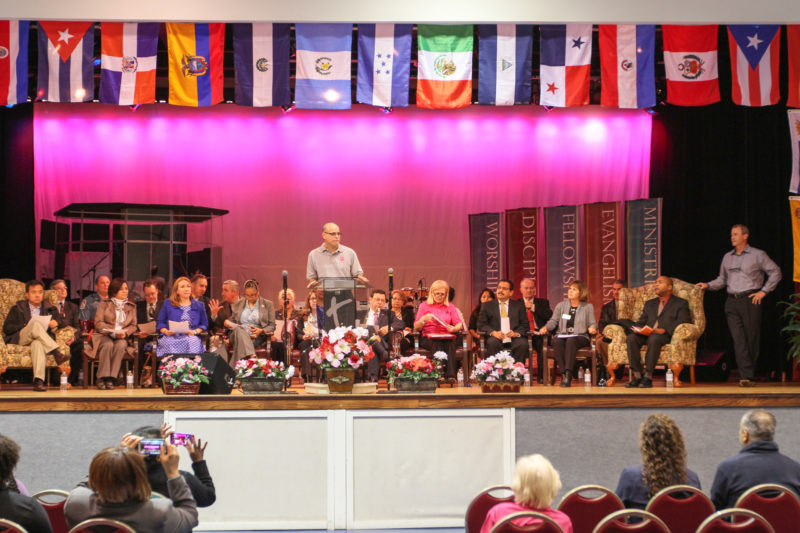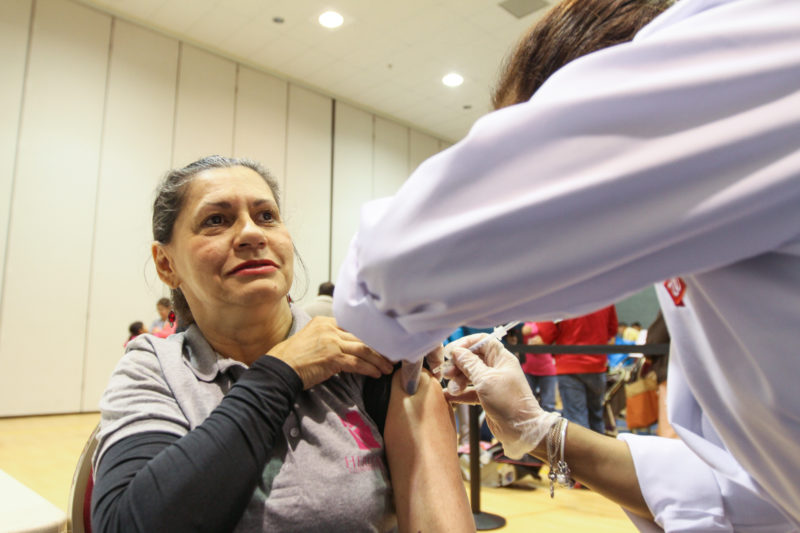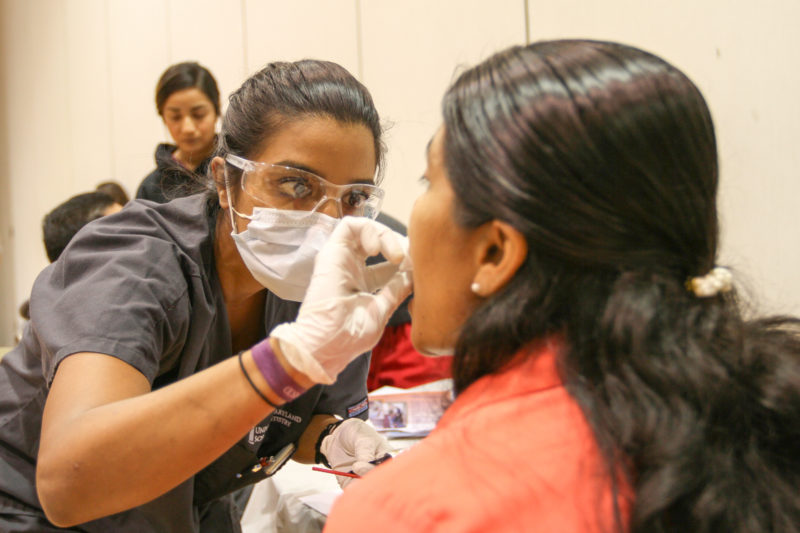
Share On Social!
Bishop Jose Torres, a father of three girls who plays volleyball in his spare time, was concerned about the lack of health awareness among his congregation in Severn, a suburb of Annapolis, MD.
He wanted to do something about it.
So with a few dedicated partners, he created a Health Festival for his community.
For over five years, the Health Festival has provided much-needed health information and services to hundreds in the community and has even saved a few lives.
Concern Over a Community’s Health
Located in Severn, a suburb of the city of Annapolis, MD (16.8% Latino), the Heritage Community Church has a sizeable Latino population. Bishop Jose Torres and the rest of the Church leadership were concerned about the health and health literacy of their congregation members.
Torres and company saw that his community wasn’t getting the health care that they needed, either because of a lack of knowledge or because of a lack of resources available to them.
“I was really distressed at seeing how little some of the people in our congregation knew about health and how they could lead healthy lives,” Torres said. “I knew I needed to do something to help them.”

Torres sought out other like-minded individuals in his community for guidance on how to help.
They identified that they needed to find a comprehensive way to educate people on what they needed to know about preventive health care.
Their idea: A health festival at the church.
“A friend of mine in the community had started a health festival years before, but was unable to keep it going for a variety of reasons,” Torres said. “When we talked about it he told me that we should take it over and grow it and he would help. It seemed like a great idea and it turned out to be exactly what the community needed.”
The friend that Torres spoke of was Carlos Camino, health educator in the community education program at the Anne Arundel County Department of Health.
Camino had been heavily involved in nurturing the Health Festival, which ran from 2002-2009 under the Anne Arundel County Department of Health’s community education program, with support from the Hispanic Health Network, a group of county-area churches with Spanish-language services.
“Thanks to [the Health Network] we had great participation [in the festival],” Camino said. “Unfortunately, in 2010 the Health Department lost some funding [and couldn’t continue the festival].”
Torres believed Heritage Community Church could take over production of the festival.
But how would they do it?
Health Outreach for the Local Community
When the County’s funding for the Festival ended in 2009, Torres and his group began to contact doctors and other support groups, including the Maryland Food Bank, to come to the festival, which they wanted to hold on the grounds of the 85,000-square foot Church. Torres needed little to convince his superiors at the Church that this event was going to be good not only for the Church, but more importantly, for the entire community.

“We wanted to gather as many services that we could to offer to our community so that they could begin the process of learning what it meant to be in good health,” Torres said. “We were fortunate to have all of this space at the Church and I wanted to get the most out of it.”
Debate: One of the strong barriers that Torres and his group needed to overcome was the “disconnect” that many Latinos and other people have toward preventive health care.
Not only did many people in the community not have access to health care, but many also did not understand nor see the need for preventive healthcare.
“There are many times when I had conversations with members of the church about their health and it was difficult to make them understand that some of their habits, like what they were eating was really bad for them,” Torres said. “I would go with some of them to their doctor’s appointments and help translate what the doctor was saying to them. I knew more had to be done.”
Early Days of the Health Festival
Based on the Health Festival that ran from 2002-2009, Torres and his committee knew they would need vendors and more than 100 volunteers to produce the free, fully bilingual festival at Heritage Community Church.
Torres said the community really stepped up in support of their plans, including provision of volunteers, free services from vendors, food from the food bank, etc.
“We’ve gotten tremendous support from the city and county government officials,” Torres said. “Everyone we have talked to has been on board with what we are doing. They have lent us their support and have told us if we need anything, we can basically have it. What we are doing helps people and I think our community leaders see that it really makes a difference and matters.”
For example, Maria Casasco, a community support grants specialist and liaison to the county executive, was instrumental in connecting the event vendors to the public in need.
Festival vendors provide many services, including: general physicals, dental screenings, vision screenings, and hearing exams.
Also offered are breast cancer, prostate, and kidney screenings, podiatry consultations, and HIV testing. Spanish-speaking medical personnel translate for the doctors to the patients, ensuring that the correct information is given to everyone.
“People have said to us that this is the only time of year that they see a doctor,” Casasco said.
All the services offered at the Festival are free of charge.
More Than Just Your ‘Average’ Health Festival
Heritage Community Church hosted its first Health Festival in October of 2010.
“We brought in vendors to offer a lot of the services we thought would be the most beneficial,” Torres said. “I wanted to give the people of our community a chance to get the type of care that I felt they were lacking.”
Camino said the festival is much more than a typical health fair.
“The difference between a health fair and the Festival we hold is that our festival is a family event, where families have the opportunity to visit different health services for adults and children, along with an entertainment center for the children,” he said. “We offer several health services like dental, prostate, vision, breast and cervical screenings, hearing, blood pressure, diabetes, and podiatrist. Also, bags are distributed to the attendees filled with healthy foods.”
With the help of his steering committee members, Torres has been able to promote and grow the Festival, which has been a resounding success.
Anticipating serving less than a hundred the first year, Torres and his dedicated crew have now touched the lives of thousands in annual festivals since 2010.
“Through the years, since we have been doing the festivals, it’s been remarkable to see how we have actually changed people’s lives,” Torres said.
Camino agreed.
“I think the Festival is necessary because we have realized that many of the people who attend is the only time they are able to seek a medical services,” said Camino. “This makes a big difference in the life of all the people who attend, many of them have informed us that because of the services they were offered they have made changes to their daily routine to live a healthier life.”
Everyone Gets Help at the Health Festival
One of the main goals each year that Torres and company have is how to ensure that everyone in their community that needs assistance receives it.
As an example, partnering with the University of Maryland’s School of Dentistry has ensured that hundreds of the Festival’s attendees are checked for oral cancer, gum disease, and cavities.
“One of the best things our Festival has offered is the vision screenings,” said steering committee member and registered nurse Diane Addo Allotey.
“We have literally helped dozens of people see. Many didn’t know how bad their eyesight really was. Many of them got the help they needed and were able to see clearly for the first time in years. It was really heartwarming.”
Torres and his steering committee, as well as the rest of the community, are dedicated to ensuring the Festival’s continuation.
“Money is always a concern,” Torres said. “We are currently exploring grant options and other sources of funds. Right now, everything is donated to us from time, to the church’s space, to the 10,000 pounds of food from the Food Bank. We have been blessed to have the help and resources we have gotten, but we want to grow so we know we will need more.”
By The Numbers
25.1
percent
of Latinos remain without health insurance coverage
This success story was produced by Salud America! with support from the Robert Wood Johnson Foundation.
The stories are intended for educational and informative purposes. References to specific policymakers, individuals, schools, policies, or companies have been included solely to advance these purposes and do not constitute an endorsement, sponsorship, or recommendation. Stories are based on and told by real community members and are the opinions and views of the individuals whose stories are told. Organization and activities described were not supported by Salud America! or the Robert Wood Johnson Foundation and do not necessarily represent the views of Salud America! or the Robert Wood Johnson Foundation.



